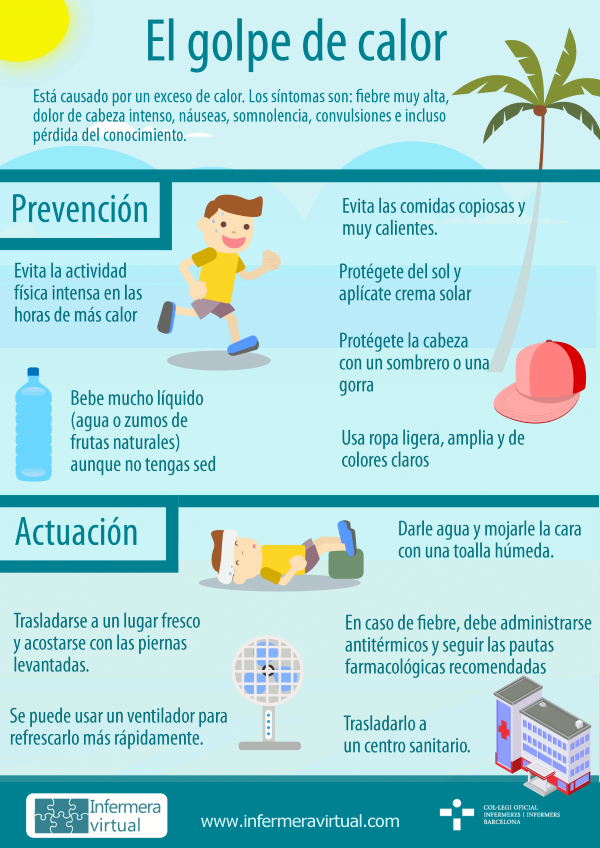Solar and hydration protection
Lee in complete content in Infermeravirtual.com
Solar radiation
Protect of the solar radiation
The protection of the sun with specific clothes and products, as well as to avoid the excessive solar exhibition, help to prevent the skin cancer. People that have trend to be burnt in the sun must take active measures, as the use of sunblocks with factor of protection tall.
A heatstroke or sunstroke

The excessive heat cause a loss of liquids and salts minerals that they can take to the dehydration; if is not acted quickly, can arrive at be a major problem.
Symptoms are : very tall fever, intense headache, nauseas, drowsiness, convulsions and even loss of knowledge.
What it is necessary to do to prevent a sunstroke
- Avoid the intense physical activity in the hours of more heat of the day.
- Drink abundant liquids (water or fruit juices) although thirst is not had.
- Avoid copious meals and very hot.
- Protect the head of the boy and to apply sunblock.
- Use light, broad and colourful clothes clear.
- If despite these measures is had a lot heat, to wet the face and the hair and even the clothes.
What it is necessary to do before a sunstroke
- Move to the casualty to a cool place and to lay down it with high legs.
- Give him water and to wet him the face with a moist towel.
- It can use a fan to refresh him with great speed.
- In the event of fever, to manage antithermal and to follow the recommended pharmacological and hygienic guidelines .
- Move it to a health centre.
Water
What amount of water need?
Daily water needs of a healthy older person are approximately of 2.5 litres and they are covered for the water that is drunk and through which contain foodstuffs.
The intake of water owes increase in cases of pregnancy, breastfeeding or other high loss situations of water, as the intense physical exercise, vomits, diarrheas, the fever or the atmosphere with high temperatures.
Functions of the water
All body systems depend on the presence of water. It fulfills following functions:
- It is the means of transport of waste substances of the organisation (urine and sweat).
- It intervenes in the maintenance of the body temperature.
- It maintains the osmotic pressure (minimum pressure necessary to to impede the step of the pure solvent's molecules towards a dissolution via a semipermeable membrane) of the subcellular and intracellular liquids, essential for the balance of the internal middle.
- It serves of lubricant; for example, for the joints of the bones (synovial fluid).
- It is the middle where they take place all metabolic reactions.
- It acts as a building material for the growth and the repair of the fabrics (structural element).
- It gives volume to the intestinal content and assistance to its elimination.
Dehydration
Is produced when the loss of liquids is higher than its contributes. Some situations that increase the loss of liquids are the fever, the shortness of breath, vomits, diarrheas, diuretics, etc. When is lost runnier of the normal thing, appears the thirst sensation, but if liquids are drunk, additional losses are replaced and dehydration is not produced.
When must drink water?
Is owed to drink when thirst is had. There is a false one belief of that an abundant intake of water contributes to increase the renal elimination of waste products and to improve the function of the kidney. However, it has just been demonstrated that the high intake of liquid decreases the risk of the training of calculations. On the other hand, in certain patients with heart or low pathology processing with certain drugs, such as diuretics or antidepressants, this measure can produce a dilution of the salts present in the subcellular liquid with damaging effects for the health.
Therefore, the recommendation of high intake of water or liquids similar, such as juices, is owed to restrict to patients with litiasis renal or to older people with cognitive alterations, whose thirst sensation can be abolished. The rest of people must drink when they have thirst.
When it comes to the healthy moment to take water, if earlier, during or after meals, no nutritional reason is not found that it can argue one of these indications. It seems that this is indifferent, provided that the ingested amount is moderate. The intake of middle litre of water (500 cm³) before meals, yes has a physiological explanation, since it can act as an antifeedant, while it lasts the détente of the stomach. This also is the explanation of that the intake of water is added to many dietetic regimes, with the aim of favouring the satiation, although this effect is of very short term.
